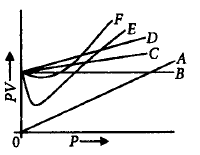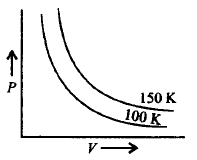171.
Which curve in figure represents the curve of ideal gas ?

A
$$B$$ only
B
$$C$$ and $$D$$ only
C
$$E$$ and $$F$$ only
D
$$A$$ and $$B$$ only
Answer :
$$B$$ only
172.

A graph is plotted between pressure and volume at different temperatures. On the basis of the graph what changes will you observe in the volume if
(i) the pressure is increased at constant temperature.
(ii) the temperature is decreased at constant pressure.
A
volume increases in both the cases
B
volume decreases in both the cases
C
volume increases in (i) and decreases in (ii)
D
volume decreases in (i) and increases in (ii).
Answer :
volume decreases in both the cases
173. At 1 atmospheric pressure and $$0{\,^ \circ }C,$$ certain mass of a gas measures $$0.4\,L.$$ Keeping the pressure constant, if the temperature is increased to $$273{\,^ \circ }C,$$ what will be its volume ?
A
0.8$$\,L$$
B
22.4$$\,L$$
C
54.6$$\,L$$
D
0.4$$\,L$$
Answer :
0.8$$\,L$$
174.
When a sample of gas is compressed at constant temperature from $$15\,atm$$ to $$60\,atm,$$ its volume changes from $$76\,c{m^3}$$ to $$20.5\,c{m^3}.$$ Which of the following statements are possible explanations of this behaviour?
(i) The gas behaves non-ideally
(ii) The gas dimerises
(iii) The gas is adsorbed into the vessel walls
A
(i), (ii) and (iii)
B
(i) and (ii) only
C
(ii) and (iii) only
D
(i) only
Answer :
(i) only
175. At $$NTP$$ the volume of a gas is $$40\,mL.$$ If pressure is increased to $$800\,mm$$ of $$Hg$$ at the same temperature, what will be the volume of the gas ?
A
38$$\,mL$$
B
22400$$\,mL$$
C
240$$\,mL$$
D
431$$\,mL$$
Answer :
38$$\,mL$$
176. Which of the following phenomena does not involve surface tension ?
A
Mercury drops acquire spherical shape.
B
Liquids tend to rise in the capillary.
C
A liquid flows over a fixed surface.
D
Moist soil grains are pulled together.
Answer :
A liquid flows over a fixed surface.
177. In the corrections made to ideal gas equation for real gases, the reductions in pressure due to forces of attractions between the molecules is directly proportional to
A
$$\frac{n}{V}$$
B
$$\frac{{{n^2}}}{{{V^2}}}$$
C
$$V - nb$$
D
$$nb$$
Answer :
$$\frac{{{n^2}}}{{{V^2}}}$$
178. Which of the following expressions correctly represents the relationship between the average molar kinetic energy, $$\overline {KE} $$ of $$CO$$ and $${N_2}$$ molecules at the same temperature?
A
$$\overline {KE} co < {\overline {KE} _{{N_2}}}$$
B
$$\overline {KE} co > {\overline {KE} _{{N_2}}}$$
C
$$\overline {KE} co = {\overline {KE} _{{N_2}}}$$
D
Cannot be predicted unless volumes of the gases are given
Answer :
$$\overline {KE} co = {\overline {KE} _{{N_2}}}$$
179. For a real gas $$\left( {mol.\,mass = 60} \right)$$ if density at critical point is $$0.80\,g/c{m^3}$$ and its $${T_c} = \frac{{4 \times {{10}^5}}}{{821}}K,$$ then van der waals’ constant a $$\left( {{\text{in}}\,atm\,{L^2}\,mo{l^{ - 2}}} \right)$$ is
A
0.3375
B
3.375
C
1.68
D
0.025
Answer :
3.375
180. At constant volume, for a fixed number of moles of a gas the pressure of the gas increases with rise in temperature due to
A
Increase in average molecular speed
B
Increased rate of collisions amongst molecules
C
Increase in molecular attraction
D
Decrease in mean free path
Answer :
Increase in average molecular speed